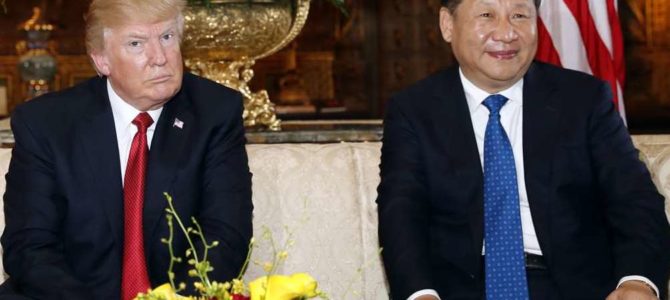
On a stop in New Hampshire today, Donald Trump will reportedly unveil the “Stop Opioid Abuse” plan, which, though it includes a number of valuable ideas, promises to be consumed by coverage of one that will do little to mitigate the opioid problem. “Death penalty for drug dealers is a discussion,” Trump has contended, “we have to start thinking about. I don’t know if this country’s ready for it.” Let’s hope it’s not.
In a number of countries, drug trafficking is a capital offense. None of these countries is the type of place we should want to emulate. Trump claims to have gotten the idea from Communist Chinese “President” Xi Jinping. So it’s worth pointing out that the Chinese War on Drugs has failed to dent illicit drug abuse, even though it’s being prosecuted by an authoritarian government deploying paramilitary forces with virtually no limits on its resources or power. Here, in a liberal nation, the Drug War proved that focusing primarily on enforcement leads first to frustration, then to mission creep, and finally to police abuse. As long as people want drugs, a market for them will exist.
Who exactly would be executed, anyway? There seems to be a populist notion that if we shoot a few cowardly drug dealers, none will follow their career path. According to the White House, the Department of Justice “will seek the death penalty against drug traffickers, where appropriate under current law.” More specifically, “certain cases where opioid, including Fentanyl-related, drug dealing and trafficking are directly responsible for death.” Instead of getting into a debate over the efficacy of the death penalty, it’s worth mentioning that the administration is talking about a few big-money narcotic traffickers.
Setting aside the legality of such a sentence, will these people be deterred by the prospect of execution, any more than they were by the prospects of a lifetime in prison? It seems unlikely. In the United States, the average death-row prisoner spends more than a decade waiting for his execution. More importantly, though distracting, the idea that there will be enough of these cases to make any difference in the recent troubling surge in opioid abuse — drugs that are widely available, often with a prescription — is even more improbable.
“I don’t think we should play games,’’ Trump recently claimed during a rally in Pennsylvania. “These people are killing our kids and they’re killing our families, and we have to do something.’’ This kind of tough talk probably sounds heartening to communities that have suffered most from the abuse of opioids. It’s understandable. But there’s an uncomfortable ethical component to the idea of executing drug dealers: The victims in these crimes were willing participants in the exchange that led to their deaths.
No, we should not underestimate the power of addiction, and it’s inarguable that some dealers and traffickers (and some doctors) are taking advantage of illness. Still, an addiction to opioids entails a series of decisions made by both parties. Whether we like it or not, millions of Americans take opioids as a legitimate way to alleviate pain and suffering. None of this is say that criminals should be absolved of their crimes, but it is to say that selling an adult something he seeks, even if it’s illegal, isn’t the equivalent of a violent criminal taking an innocent person’s life — a crime that itself doesn’t carry death penalty most of the time.
The Trump plan has many seemingly worthwhile pieces: Asking states to opt into a database that allows doctors to track patients who have been regularly shopping for opioid prescriptions. Screening inmates for opioid use when they enter federal prison so they can seek treatment. Expanding the availability of naloxone, a drug that reverses opioid overdoses (though a recent controversial study claims the life-saving properties of the drug help propel addiction though moral hazard). Urging Congress to pass legislation that curbs Medicaid from continuing to help propel the problem.
Trump will also reportedly ask Congress to pass legislation reducing possession amounts enough to trigger mandatory minimum sentences for traffickers. The administration says that while pursuing harsher penalties for big players in opioid trafficking, they would like to see sentencing reform for those “other people languishing in prison for these low-level drug crimes.”
While lots of these ideas focus on the addicts, most of the coverage is almost certainly going to focus on the idea of “executing drug dealers,” which is bluster masquerading as a solution. It’s a reflection of desperation, not rational thinking. In the end, figuring out why so many Americans are turning to opioids for their pain and addiction is a lot more important than attempting to obliterate those who provide it.








